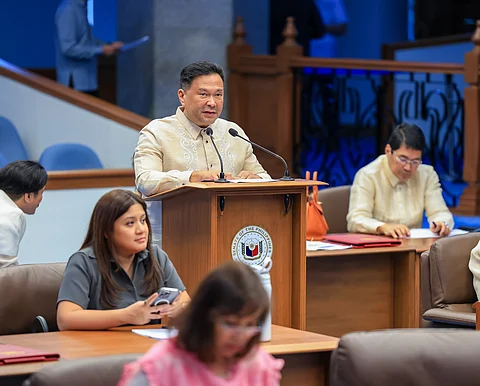
- NEWS
- the EDIT
- COMMENTARY
- BUSINESS
- LIFE
- SHOW
- ACTION
- GLOBAL GOALS
- SNAPS
- DYARYO TIRADA
- MORE

To determine whether the Universal Health Care (UHC) Law is being effectively implemented and truly benefiting the poorest of the poor, Deputy Majority Leader Senator Joseph Victor “JV” Ejercito has called for the creation of a Joint Congressional Oversight Committee that will focus on its execution.
“The Universal Healthcare Act is a health reform law—the realization and embodiment of our government’s care towards our people. Ours is a healthcare system that is complex, fragmented, and multifaceted. There are many issues to be addressed, a lot of pieces to be put together, and several views to be recognized,” Ejercito said in his privilege speech during Monday’s Senate plenary session.
Republic Act 11223, or the UHC Act, of which Ejercito was one of the principal authors, automatically enrolls all Filipinos in the National Health Insurance Program or PhilHealth. It aims to provide equitable access to quality and affordable health care services with financial risk protection for all, including Overseas Filipino Workers.
“Fortunately, the UHC does not distinguish the rich from the poor, privately insured or not. Every Filipino is automatically a member of PhilHealth and is entitled to its benefits. In times of dire financial constraints, PhilHealth can help supplement the hospital bill payments of those insured. For those not privately insured, this is their relief from medical expenses,” he added.
Sen. Bam Aquino expressed his full support for the UHC Law and its implementation for the welfare of the Filipino people.
“I would like to reiterate my support for the good sponsor of the UHC Law. This is a serious matter, but we promise and commit to engage and to support the efforts of the chairperson of the Committee on Health and Sen. Ejercito about the amendment or the changes that he wanted to see in this law,” Aquino said.
However, Aquino sought clarification on the “no balance billing” policy — specifically, who qualifies for the program and how it could eventually cover all Filipinos.
Ejercito responded that only indigents, persons with disabilities, and senior citizens are currently prioritized for the no balance billing program, but emphasized that the UHC Law intends to accommodate all Filipinos.
Aquino also asked how much funding is needed for the UHC Law to be fully implemented to achieve universal coverage.
Meanwhile, Sen. Raffy Tulfo lauded Ejercito for championing the UHC Law and supporting the sustainability of zero-balance billing.
However, Tulfo stressed that healthcare in the Philippines remains financially inaccessible to many, with patients facing systemic delays, out-of-pocket costs, and reliance on guarantee letters for hospitalization.
“These are the challenges that our people face. Every day, thousands of Filipinos walk into hospitals with a sick parent, child, or sibling, only to realize that to afford the treatment, they will have to knock on the doors of different agencies,” Tulfo said.
Citing data from the Philippine Statistics Authority, Tulfo said that last year alone, out-of-pocket payments accounted for 42.7 percent of the country’s health expenditures.
The figure, he said, reveals that Filipino households still shoulder nearly half of healthcare costs, often paying cash or borrowing money despite being PhilHealth members.
“The resources already exist—the public has contributed through taxes and monthly PhilHealth premiums. What is lacking is the efficient disbursement of funds and the political will to eliminate middlemen in our access to the healthcare system,” Tulfo added.
